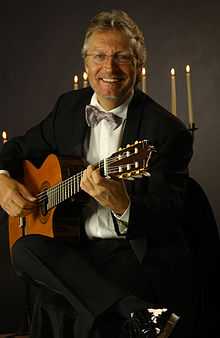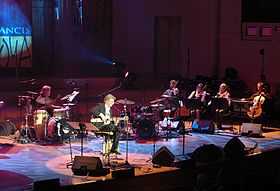Francis Goya
| Francis Goya | |
|---|---|
 | |
| Born |
Francis Weyer 16 May 1946 Liege, Belgium |
| Nationality |
|
| Occupation | guitarist |
Biography
Born to a family of musicians, he took a guitar in his hands for the first time at the age of 12. At 16, Francis Goya formed his first group (Les Jivaros) together with his brother who played the percussion, and several friends. In 1966 he became acquainted with a singer named Lou who joined Francis’ rock group, The Liberty Six (Later, Lou was a producer for Plastic Bertrand and composed for him the song Ça plane pour moi which gained success all over the world). In 1970 Francis Goya was invited to a professional soul music group J J Band, with which he recorded two albums, the second of them produced by Brian Bennett, percussionist for The Shadows. This LP was recorded in London for CBS. Thanks to J J Band, Francis Goya took part in a tour over Europe and Africa. He also became a studio guitar player, and played on the stage with performers of different styles, such as Demis Roussos, The Three Degrees, Vicky Leandros, and others.
The Brilliant Idea: Nostalgia
In 1975, he released his first solo LP Nostalgia, which quickly reached top positions in the charts. Nostalgia was a tender and romantic melody written by Francis Goya and his father. That was the beginning of his international career. Francis Goya tours with his performances all over the world, from Asia to Latin America, South Africa, Russia etc. Between the tours, he records at least one new album; their number has already reached 35 LPs and CDs, and most of them have the status of a gold disc or platinum disc. As of today, Francis Goya has sold over 28 million of his albums all over the world; this is quite a rare case for instrumental music. Francis Goya directed the Eurovision orchestra in Rome (during Luxembourg's performance) in 1991 and in Ireland in 1993.
Latin American Influence
Francis Goya has always admired Latin American music. In 1991, he decided to record, concurrently with instrumental music, a CD containing Brazilian songs (Bahia Lady). The timbre of his voice and passionate guitar-playing turned out to be a marvelous combination, and the public liked it. He decided to continue working in this way, and, in 1992 and 1993 released two new albums of the same style (Noche Latino and Festival Latino). 1994 was the year for “going back to the roots”, for releasing a new CD of instrumental music, and for a tour of over fifty concerts in the Netherlands. In 1996 a new musical CD in the New Age was released (Gondwana). In 1998 Francis Goya recorded beautiful songs of Jacques Brel, these were released on a CD and distributed all over Europe. Later, a duet album with Richard Clayderman was recorded.
Wind from the East
The Moscow Nights which was recorded in Moscow, was released in 1981 in all countries of the former Soviet Union, and won enormous success; this allowed Francis Goya to become a West-European star in Eastern Europe.
March 2001: First Concerts in Estonia

After twenty years of success in Eastern Europe, in 2001, Francis Goya was invited to give a concert in Estonia in the Tallinn Philharmonic Hall, with accompaniment of the Chamber Orchestra of the Philharmonic Hall, directed by Jean-Luc Drion, a pianist and a director, who had, by the time, been a friend of Francis Goya for 30 years. The first concert was such a success that Francis Goya had to prolong his stay in Estonia and give a second concert on the following day in the same Philharmonic Hall. After such first experience in Estonia, Francis Goya decided to record an instrumental album that included pieces by the great Estonian composer Raimond Valgre. That album was also a huge success in Estonia. Furthermore, the Russian album entitled A Tribute To Alexandra Pakhmutova which was recorded in Saint Petersburg was widely distributed in Korea, Taiwan and China.
Due to his popularity, Francis Goya regularly goes on tours all over the world, and the public receives every concert with exceptional enthusiasm:
- March 2004: A concert in Jakarta (Indonesia)
- April 2004: A concert in Saint Petersburg (Russia)
- October 2005: Palais des Beaux Arts in Brussels (Belgium)
- March 2006: A concert in the Saint Petersburg Philharmonic Hall (Russia)
- April 2006: A concert at Abbaye de Forest in Brussels (Belgium)
- May 2006: A tour of three concerts in Poland (Poznan, Krakow, and Warsaw)
- May 2006: Participation in Braine-l'Alleud Festival (Belgium). Et si on se faisait plaisir
- June 2006: Recording an album specially for China
- September 2006: A concert in l’Église St Étienne in Braine l’Alleud
- November 2006: A grand tour over the Baltic countries
- December 2006: Concerts in Jakarta and Singapore; a concert in the Oktyabrsky Concert Hall in Saint Petersburg (Russia).
- March 2007: Concerts in Tallinn (Estonia), Vilnius (Lithuania), Riga (Latvia), Vameira, Tartu (Estonia), and Pärnu (Estonia)
- April 2007: A grand concert in Moscow
- May 2007: A gala concert in Cambodia for the benefit of humanitarian organizations (Lions Club)
- May 2007: A concert at the World of Guitar Festival in Kaluga (Russia)
- September 2007: A concert in Waterloo (Belgium)
- October 2007: A concert for the benefit of St Michel Oncological Charity Foundation in Nivelles (Belgium)
- October 2007: A grand tour over Russia
- February 2008: A grand tour over South Africa
- March 2012: Concerts in Vilnius (Lithuania), Tallinn (Estonia), Riga (Latvia), Moscow, Saintt Petersburg, Tyumen, Omsk, Novosibirsk, Ekaterinburg, Izhevsk and Kirov (Russia).
- March 2013: On the occasion of Women's Day, two concerts "Romantic Guitar" 7 in Saint Petersburg Russia, 8 in Tallinn Estonia
In 2006, rapper Busta Rhymes reproduced a sample from Francis Goya’s old work Faded Lady, which became No.1 on the USA Top-100 under the title of New York Shit (album The Big Bang (album))
In 2007, the group Safri Duo (Falling Hight) used a sample from Tonight’s the Night piece, which was written by Francis Goya in 1976.
In January 2008, Francis Goya and his family decided to move to Marrakesh (Morocco). Francis Goya continued giving gala concerts in Canada, South Africa, Russia, and Estonia.
In 2010, Francis Goya opened his first musical school Ateliers Art et Musique (Art and Music Studio) in Marrakesh.
In 2011, he established the Francis Goya Foundation for cultural development of Moroccan children and teenagers from “problem” regions Site officiel de la Fondation Francis Goya with the assistance of the Belgian Ambassador to Morocco, Consul of Belgium in Morocco, and high officials of the State of Morocco.
2012: A grand tour over the major cities of the Baltic countries and Russia is planned.
Atelier Art et Musique (Art and Music Studio) in Marrakesh (Morocco)
The school is dedicated to love of arts and music. l'Atelier Art & Musique Francis Goya. On the initiative of Francis Goya and his daughter Valérie, who also works for the Foundation, l'Atelier Art & Musique Francis Goya was established on 8 March 2010. Moral support of the Consulate of Belgium and Prefecture of Marrakesh and partnership with Yamaha, allowed commencing studies in instrumental and vocal disciplines. Francis Goya provides classes for everyone, from beginners to mature musicians, and in everything, from musical development to solfeggio, including multivarious classes in playing the guitar, the piano, and the violin, and classes of magic, dancing, and singing. And indeed, over a hundred students of various levels enrolled for various courses, thus displaying a vivid interest towards their school.
Francis Goya Foundation for cultural development of children and teenagers from “problem” regions
Francis Goya Foundation : Art and music for destitute children all over the world.

Throughout his entire long career as a composer and a musician, Francis Goya has always taken part in charity campaigns aimed at collecting donations for the financing of orphanages and secondary schools in Cambodia, the department of urgent pediatrics of the Queen Fabiola Hospital (l’Hôpital Reine Fabiola) in Belgium, and Saint Michel Oncological Foundation in Brussels. When Francis Goya moved, a long time ago, to Morocco he saw that development of Moroccan young population needs support.
A brilliant idea occurred to him when he was traveling over the south regions of the country. He was playing the guitar, with his family around him, at a bivouac near a small village, when suddenly a crowd of children ringed round him and started listening too. The idea was developed further: Francis decided to establish a Foundation for revealing of new talents among children and teenagers from “problem” regions and helping them develop their musical talents. To establish the Francis Goya Foundation, support has been received from Francis Goya’s Moroccan and European friends, who share the same values. The approach consists in arranging free concerts in order to collect funds to buy musical instruments and to finance singing and dancing classes for children. Schools, orphanages, and mountain regions are visited in order to discover young talents who would benefit from serious musical classes and gain and opportunity of studying abroad, and to find those who need long-term control and assistance. “When live is generous to us, there comes time to give and time to serve – the more so, because music makes hearts warmer. Today is an important day: we are laying the first stone to the base of the edifice, and we would like to use this opportunity to appeal to generosity of the donators for the financing of our ambitious projects, such as donation of musical instruments or taking the charge of conducting artistic classes for children and teenagers from “problem” regions (such as orphanages, hospitals, douars). I would like to thank you in advance for the coverage and publicity that you can give to this good initiative” – the speech of Francis Goya, President of the Francis Goya Foundation
Francis Goya has some 40 album releases to his credit.
Discography
Singles
- "Nostalgia"/"Nautilus" (1975)
- "Concierto d'Aranjuez"/"Lovers melody" (1976)
- "Maria Padilha"/"Daddy's bolero" (1976)
- "Caf'Conc'"/"Tangoya" (1976)
- "Gipsy Wedding" (1977)
- "Argentina"/"Natasha" (1978)
- "Manolita"/"Natasha" (1978)
- "Moscow nights"/"Song of the Dnjepr" (1981)
Albums
- Nostalgia (1975)
- Maria Padhila (1976)
- Sweet & Softly (1977)
- 16 Droommelodieën (1978)
- 16 Gouden Successen (1978)
- Argentina (1978)
- Christmas Party (1978)
- Souvenirs aus Griechenland (1979)
- Summernight Moods (1979)
- Guitarra Romantica (1979)
- Romantic Guitar (1985)
- This is Francis Goya (1986)
- Rendez-vous (1988)
- Plays His Favourite Hits Vol.1 (1990)
- Bahia Lady (with Carmina Cabrera) (1990)
- Noche Latino (with Carmina Cabrera)(1993)
- Festival Latino (with Carmina Cabrera)(1994)
- The Very Best of (1994)
- Together (with Peter Weekers) (1994)
- Jacques Brel (1998)
- Plays His Favourite Hits Vol. 2 (1998)
- Francis Goya in Moscow (1999)
- Together (with Richard Clayderman)(2000)
- Latin Romance (1999)
- Best of Francis Goya (1999)
- De Mooiste Sfeermelodieën (2000)
- Pleased to meet You, Mr. Valgre (2001)
- Hollands Glorie (2002)
- Hollands Glorie Kerst (2002)
- A tribute to Alexandra Pakhmutova (2002)
- Klassieke Droommelodieën (2003)
- Rakkaudella (2004)
- Intimité (with Jean-Luc Drion)(2004)
- Magic Moments (2004)
- Gondwana (2004)
- Face to Face (2005) (with Richard Clayderman)
- Wings for life (2008)
External links
| Wikimedia Commons has media related to Francis Goya. |
- (French) Official website Official website
- (French) Francis Goya Foundation
- (French) Atelier Arts et Musique
- (French) Francis Goya at the Belgian Pop & Rock Archives
|